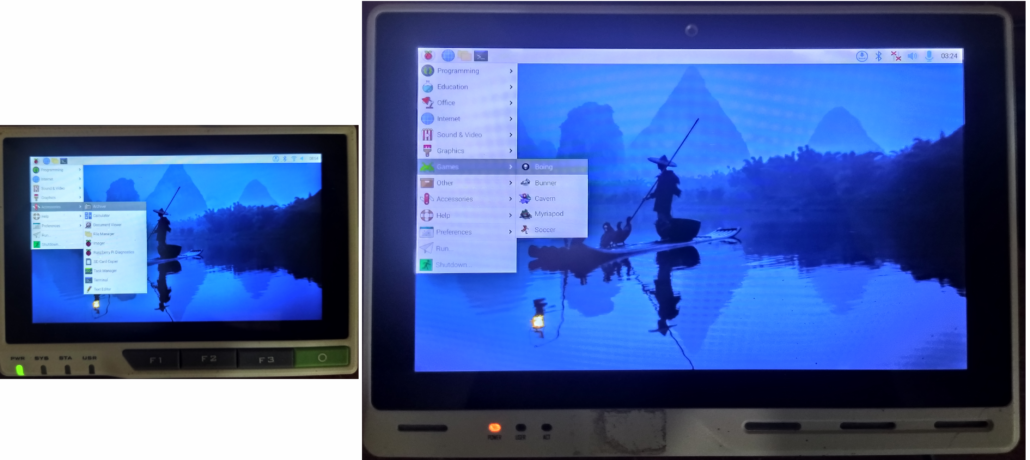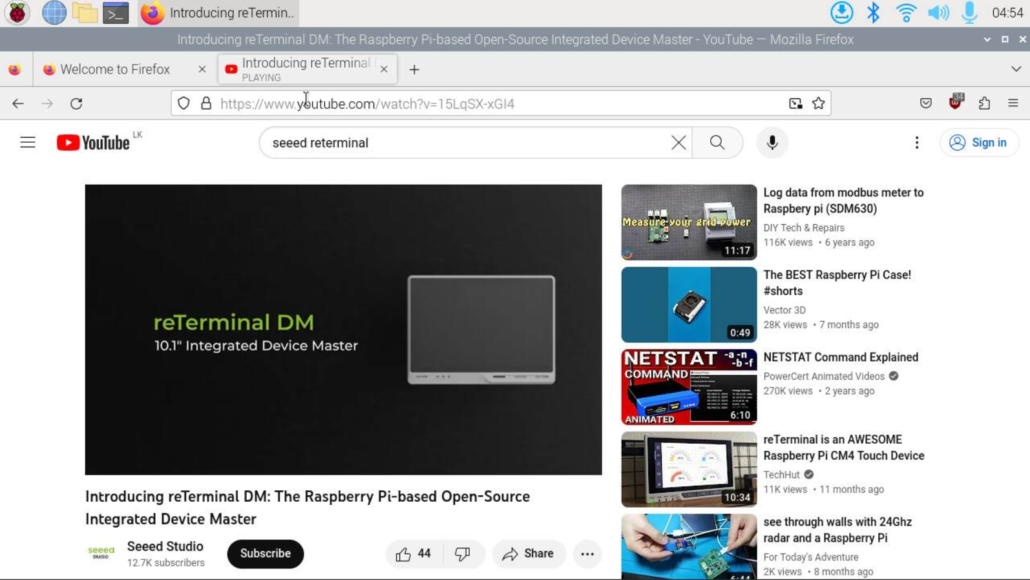Unveiling Raspberry Pi OS Bookworm: A Debian 12 Upgrade
Introduction
In our recent blogs, we’ve talked about how cool Raspberry Pi 5 is—its smart moves in machine learning and how it handles heat with active coolers. But now, let’s dive into some fresh news! Raspberry Pi just released a new operating system called Bookworm. It’s like a digital makeover, moving up from the previous “Bullseye” to the new and shiny “Bookworm,” which has been running the show since November 2021.

Figure: After installing Bookworm OS to reTerminal and reTerminal DM
Excitingly, our hands-on experience with Bookworm extends beyond the digital realm. We’ve rigorously tested the 64-bit version on both reTerminal and reTerminalDM devices, ensuring a firsthand understanding of its performance and capabilities. Our commitment to providing you with accurate and valuable information extends to our updated wikis, reflecting the latest insights into Bookworm’s features, optimizations, and compatibility. Join us on this journey as we delve into the nuances of Raspberry Pi OS Bookworm, uncovering the subtle yet impactful changes that promise to elevate your Raspberry Pi experience.

Figure: Bookworm VS Bullseye desktop appearance after fresh booting
The New Face of Raspberry Pi OS Bookworm: Hello Wayland!
This time RPi Says goodbye to the old X11 window system in Raspberry Pi OS Bookworm because Wayland is here to take center stage.
So, what’s Wayland? Think of it as a language that lets apps and the display server (the boss that handles what you see on the screen) have a good chat. In simpler terms, it’s like the smooth talk that happens between your favorite game and the screen it’s playing on. Wayland is not just a language; it’s also a cool setup where each graphical environment brings its own boss called a “compositor.” This boss, or compositor, makes sure everything looks nice and handles how you interact with your Raspberry Pi. Unlike the old X11, where one big boss (Xorg) handled everything, Wayland brings in different bosses for different graphical environments, adding a touch of personal flair to how you experience Raspberry Pi OS Bookworm.
In Debian, the majority of programs are now compatible with Wayland. However, for those still dependent on X11, XWayland steps in to manage X11 calls and seamlessly bridge compatibility with Wayland. Despite this effort, a few elements remain problematic as a result of the transition to the new window manager.
Where is Real VNC?
RealVNC faces compatibility issues with Raspberry Pi OS Bookworm because the Wayland security model doesn’t support traditional remote desktop access. As a workaround, wayvnc is employed. However, it comes with a drawback—fewer clients seamlessly integrate with it. According to the Raspberry Pi team, a recommended alternative is the TigerVNC client, which works well with the new system.

A Dual Delight: Raspberry Pi OS Welcomes Firefox and Chromium
In a noteworthy update, Raspberry Pi OS Bookworm unveils a new browsing experience with the introduction of a Raspberry Pi-optimized version of Mozilla Firefox. This marks a significant departure from the past when the sole available browser was an outdated Debian version. The Raspberry Pi team has invested substantial effort to ensure users enjoy the best possible experience with the latest Firefox release, collaborating closely with Mozilla and the wider Firefox community.
Raspberry Pi OS Bookworm introduces significant enhancements for web browsing, particularly with the integration of V4L2 codec support in Firefox. This improvement enables Firefox to leverage the hardware h.264 decoder on Raspberry Pi, offering substantial performance boosts and reduced CPU load during HD video playback, especially beneficial for older Raspberry Pi models. Additionally, the update includes Widevine DRM support for various video streaming services and graphical optimizations to enhance overall performance, particularly on low-power devices. Noteworthy features also extend to video calling, with Firefox seamlessly integrating with CSI cameras using libcamera and supporting desktop sharing on Wayland right out of the box. This dual-browser option adds flexibility, allowing users to choose between Firefox and Chromium for an enriched browsing experience on their Raspberry Pi devices.

Figure: Connect my Bluetooth speaker and surf the internet through Firefox
Bye Bye PulseAudio and ALSA and welcome PipeWire
In a notable shift, Raspberry Pi OS Bookworm bids farewell to PulseAudio and ALSA, ushering in the era of PipeWire for audio management. This transition marks an evolution from PulseAudio, offering enhanced features, particularly in optimizing audio for video content. PipeWire not only reduces latency, crucial for various applications, but also improves the management of Bluetooth audio devices. It intelligently remembers which devices were in use at power-down, seamlessly reconnecting them upon boot. Moreover, PipeWire is tailored to function more effectively in the secure Wayland environment, where applications are isolated from each other. This audio system upgrade signifies a commitment to refining the audio experience on Raspberry Pi devices, aligning with the evolving demands of modern multimedia applications.

What about Networking?
In the realm of networking, Raspberry Pi OS Bookworm introduces a pivotal shift by adopting NetworkManager as the default network controller. This transition brings forth a comprehensive set of functionalities, essentially encompassing everything previously handled by dhcpcd. What sets NetworkManager apart are its enhanced capabilities, including support for concealed wireless networks and seamless integration with virtual private networks (VPN). Notably, users can now transform their Raspberry Pi into a wireless hotspot, expanding the device’s utility in various network setups. This strategic move to NetworkManager signifies a robust upgrade, aligning the Raspberry Pi OS with modern networking demands and offering users a more versatile and feature-rich networking experience.

Figure: Network Manager as Network Handler
What else in TaskBar?
In this latest update, Raspberry Pi OS Bookworm introduces a pair of new plugins to enhance system monitoring. The “Power” plugin, now enabled by default, actively monitors for potential power supply issues such as low voltage or excess USB current. This feature aims to alert users to any power-related concerns, ensuring the stable and optimal performance of their Raspberry Pi devices. Additionally, the new “GPU” plugin provides users with a graphical representation of the load on the Raspberry Pi’s GPU. While not activated by default, this plugin offers users the option to visualize GPU performance, providing valuable insights into the graphical processing capabilities of their Raspberry Pi.

Figure: GPU plugging
Bye Bye BlueJ, Magnifier SenseHat emulator
The SenseHAT Emulator currently lacks compatibility with Bookworm, but efforts are underway to address this, with an anticipated resolution in a few weeks. Meanwhile, the Magnifier accessibility tool faces limitations with Wayfire, though Wayfire has its own built-in magnifier accessible with ctrl-alt-M. Notably, third-party programs like BlueJ and Greenfoot Java IDEs are incompatible with Wayland, while Sonic Pi faces compatibility issues with PipeWire. As a result, these programs have been temporarily removed, pending updates from their developers to align with the evolving compatibility standards.
About Python Virtual Environment
In earlier OS versions, Python libraries could be directly installed system-wide using pip, the Python package installer. However, in Bookworm and subsequent releases, a shift has occurred. To mitigate potential issues during installation, it is now necessary to install packages via pip into a Python virtual environment using venv. This virtual environment serves as a secure container, allowing you to install third-party modules without the risk of interference or disruption to your system’s Python functionality. Learn More
Want to buy Seeed Studio’s Products?


Mostbet AZ veb-saytında https://mostbet-az-online.net/promo-code/ bul etməyimə kömək etdi. Azərbaycanda Mostbet üçün promo kodların tapılması xoş sürpriz oldu və təcrübəmə əlavə dəyər qatdı. Veb saytın əlavə məlumatı qiymətli resursdur və onu onlayn kazino dünyasındakı ən son tendensiyalar və anlayışlardan xəbərdar olmaq üçün əsas yer halına gətirir.
A shame there’s no switch for animations.